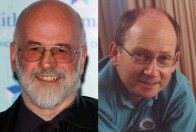Through the Lands of Fantasy: A Conversation with Lev Grossman, Author of The Magicians
By Christy Corp-Minaniji at Seattle Pi

When not in the hallowed space at the front of the store, The Magicians leads a dual life from one bookstore to the next – sometimes residing with fantasy, sometimes with literature. The split life of this novel relates directly to its creator’s crusade against the cultural ostracism of genre fiction from the realm of literature. Though the literary critic for a bastion of mainstream intellectual thought, Lev Grossman rails against the view of popular fiction as lowbrow or unworthy to be classed with literary fiction. “It shows how bizarrely inverted our literary culture has become that this is controversial…There’s been such a stigma with popular fiction that it wasn’t appropriate at Time, before I came to work there, to review the type of book that readers of Time actually read.” Though Grossman’s careful, modulated voice never raises, indignation laces his words. “Fiction that emphasized plot fell into disrepute… we’re finally seeing a reversal of that trend.” Grossman cites authors such as Clarke and Neil Gaiman as leading this reversal. “They write novels that confound attempts to classify them. Seeing them do that made me feel that I could and should write The Magicians.”
Read More here
Justin Cronin dissects vampire lore
By Lauren R. Harrison at The Chicago Tribune

There were vampires. Scientists. A virus. A father-daughter relationship. And endless narrative possibilities.
“I kind of want to write outside of a category because I can. … I’ve always tried to do more than one thing at the same time,” he said, adding that was true of his book “Mary and O’Neil” (2001) for which he won a PEN/Hemingway Award and Stephen Crane Prize, and of “The Summer Guest” (2004).
Taking from genres like gothic horror, Western and apocalyptic fiction, “The Passage” asks “what if all the vampire lore … actually had a scientific and historical reality in some way and what would it be like?”
Clever details about mirrors and crosses emerge as part of that answer by no mistake. “I’m not a writer who sits down and says, ‘Let’s see what the angels say today.’ I’m very much a planner,” Cronin says.
Read More here
Transworld Publishers Announce Exciting New Collaboration Between Sir Terry Pratchett And Stephen Baxter
via Book Trade Info

Sir Terry Pratchett first developed his vision of a chain of parallel worlds, The Long Earth, in an unfinished novel and two short stories in 1986, after writing Equal Rites, the third novel in what would turn into the hugely successful Discworld series. Now, at last, this long-gestating concept is to see the light of day in two as-yet-untitled books written in collaboration with Stephen Baxter, author of Flood, Ark and the Time’s Tapestry and Destiny’s Children series.
‘Our Earth is but one of a chain of parallel worlds, each differing from its neighbours by a little (or a lot) in an infinite landscape of infinite possibilities. And you can just step from one world to the next…’
Read More here
Blast from the Past: A CANTICLE FOR LEIBOWITZ
by Terry DeHart at Orbit Books

Summer is a great time for science fiction fans to indulge their inner Eeyores. After reading Mira Grant’s latest, what could be better than stretching out under all that depressing sunshine with a classic book of the post-apocalyptic genre?
A CANTICLE FOR LEIBOWITZ covers a large swath of time as the human race attempts to put itself back together after a no-hold-barred nuclear war. It begins many hundreds of years after the game of fun with fusion was played, but the setting is still deliciously scorched and barren and humankind is poor and superstitious and still a wee bit mistrustful of science.
The protagonists of each of the three sections of the book are associated with the Abbey of Leibowitz, which has been charged with the preservation and interpretation of knowledge from ancient pre-war times—the wondrous times in which we now live. Much of the book explores the primary objective of people living in times “simplified” by lack of technology—to get the lights back on.
Read More here
Canticle for Leibowitz has been on my (long) list of stuff I want to read, but after this article reminded me what it was about, I may move it to the top of the pile. The new Terry Pratchett book sounds good too, I’ve read Good Omens (a collaboration with Neil Gaiman) and I just started the Discworld series, so I know I like his style. I’m still going to wait until The Passage comes out on paperback, but I am looking forward to reading it.
What do you think of fantasy and science fiction becoming more mainstream? What are your favorite vampire myths?
